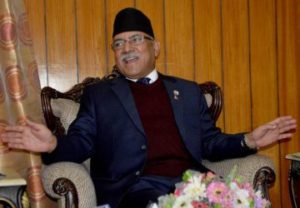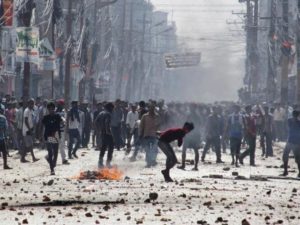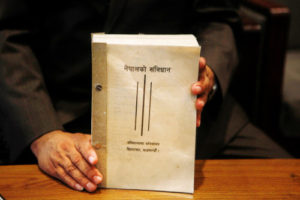The last word from the United Democratic Madhesi Front (UDMF) is that they can’t go ahead with local polls whatsoever unless the Maoist-NC government’s proposal for amendment of the constitution – which is in favour of Madhesi demands – has been passed. The Madheshi Morcha (SLMM) even pledged just a few days ago that if local elections are announced without meeting their demands with respect to the constitution, they will return to violent protest.
General Secretary of National Madhesh Socialist Party, Keshav Jha, said less than two weeks ago that compromise on the constitution is not an option: “We are not in a position to go to elections without the constitution amendment. We cannot go to elections with the issue of amendment as our [main] political agenda.”UML leader, KP Sharma Oli, on the other hand, is against local elections if held under the current amendment proposal. While PM Dahal and NC leaders have been trying to have the amendment passed in Parliament, the UML has rejected it, insisting that local elections be held under the constitution as it stands. Or under an amendment which the UML can approve.
The restructuring of local bodies is another hurdle on the road to local elections. The Local Bodies Restructuring Commission (LBRC) published its long-awaited report in mid-January, proposing to reduce the number of municipalities and VDCs by over one-third to just 719 local bodies. Loud protests in many districts has led the government to reconsider.The cabinet just decided to create a team under Ministry of Federal Affairs and Local Development to again scrutinize the options in re-delineating local bodies, taking local views more into account. So, how many local bodies would be appropriate and where should the boundaries run? Well, the team has until May 24 – that’s when the elections are supposedly on – to decide.
On the upside, Chief Election Commissioner, Yadav, told PM Dahal two weeks ago that unless five pending election law bills had been duly passed in Parliament by January 31, the EC could not get ready in practice to hold local elections by mid-May. Now, parliament has passed four of those five bills. Ostensibly, this is good enough, at least according to PM Dahal.The EC deadline for parties to register for the local elections was officially on January 31 as well, though. By this date only 45 of Nepal’s altogether 111 eligible parties had registered. So, it will be a local election with many “faces” missing, so to speak, unless the EC decides to extend the deadline. This is just another issue.
Will PM Dahal and his government take the amendment proposal with respect to the constitution off the table and listen to the UML? It seems not. Instead, he and other cabinet members continue to say that “talks will be held with all parties” – meaning the UDMF and UML as well – in order to reach “consensus” and go ahead with the local election “as planned”.But is such a consensus even within reach? Well, amendment of the constitution and local elections have been tied together like a Gordian Knot for a very long time. Will this knot loosen to allow for the first local election in Nepal for 20 years? Or will it only tighten more and protests, perhaps even riots, reignite in the districts? Well, it is still hard to tell for sure.
Under the constitution, elections to national, provincial and local government must have been held by December 2017 at the latest. There’s no election date yet, except “mid-May”, and hurdles are cuing up. Yet, this is still the closest to a local election for many years. So, in spite of all: here’s to optimism.






